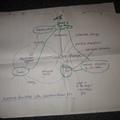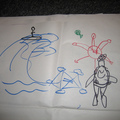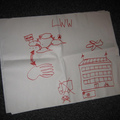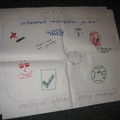How do we connect activism in Leeds and grow?
Tagged as: culture economic_crisis environmentalism free_spaces social_strugglesNeighbourhoods: leeds
How do we connect all this great activism in Leeds together? How do we grow as a movement so that we can demand, not ask, for change? How do we build our power? And how do we get from A to B?




Click on a thumbnail for a slideshow view
How do we connect all this great activism in Leeds together? How do we grow as a movement so that we can demand, not ask, for change? How do we build our power? And how do we get from A to B?
Such were the questions asked at a meeting held on Monday (the 20th), organized by Leeds TIDAL and TINWOLF as an eco-cafe, the first discussion in a series of 4. Between 30 and 40 people turned up, many - though not all - already engaged in groups like REAP, Transition Towns, Leeds Urban Harvest, People & Planet, Leeds Permaculture Network and the Permaculture Association, the Royal Park School campaign, Christian Aid and Plane Stupid, among others.
To begin to answer these questions, it seemed prudent to first imagine what a global justice movement might look like if it were thriving in Leeds, then to reflect on these common visions, before asking the more practical question of how to get there.
"What would a Leeds global justice movement look like if it were massive?"
Should there already be a "successful" global justice movement, the job would be done and everyone could relax... But beyond this statement, the emphasis was on empowerment, creativity, and enjoyment, and that really a successful movement would mean better quality of life for all. The importance of experience was discussed and there was also talk about recognising different components, things like access to land and housing, affordable and small scale clean energy, education and ways to share skills and knowledge, local food production, and so on. These resources, or movements, have fluid boundaries and connections. What could form the substance of these connections? It seemed that this meeting was already fulfilling one of the critical functions of opening up public space for people to engage in these conversations in the first place.
In discussions later, people talked about the need for more solidarity between diverse activist groups in Leeds (and perhaps this was one form of those connections?). There already are many active people, it's just that everyone seems to be doing their own thing without looking at what others are doing.
Chris Johnston of TIDAL estimated that half of Leeds (that would be 375,000 people) is already taking some form of "basic action," like donating to Haiti relief appeals or recognizing the Fairtrade mark. And while 350 people from Leeds might be mobilized to head down to a national demonstration, up to 100 might take part in a local demonstration. But beyond just looking at numbers, one man interjected, what about the effectiveness of people's actions? After all, the Leeds 40:20 campaign was spearheaded by just 8 people, with a petition of about 200 signatures. And what do people mean by "action," anyway, when you take into account the more "practical," day-to-day actions of someone sharing fruit with Leeds Urban Harvest? Looking to what really mobilized people in the past, someone said "what we need is another Poll Tax!" But with a wave of budget cuts hitting people hard, isn't this enough to get people out of their chairs, to radicalize and unite people?
"How do we get from A to B?"
"Hub" was one key word - one way of connecting people, representing some form of physical (or even virtual space), where the energies of different people and groups could feed into each other. Here is some of the feedback summarised from different working groups:
"Address anxieties through counter-cultural fun!" "Fight inertia!"
Building communities, enoughness, raising self-esteem and responsibility. Aspirational lifestyle!
Resources (energy, time)
Communication (overview)
Organization (co-ordination, using existing systems)
1 - Hold an open discussion with all active groups in Leeds
2 - A hub, we need one. Physical space, online
3 - Working out common aims
4 - Engaging with the mainstream media, and independent media like indymedia
Ideas of space and communication were recurrent themes, having discussions, connecting activism, overcoming (or working with) differences and coming to common understandings, and helping each other out where there are common aims. "Solidarity." The question then becomes, what is the thread that binds us together?





